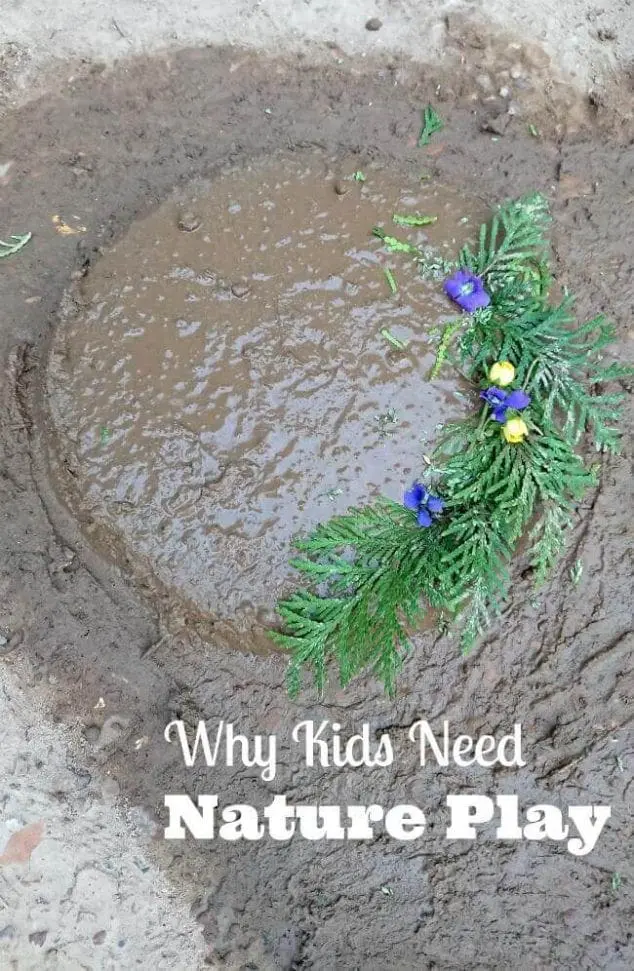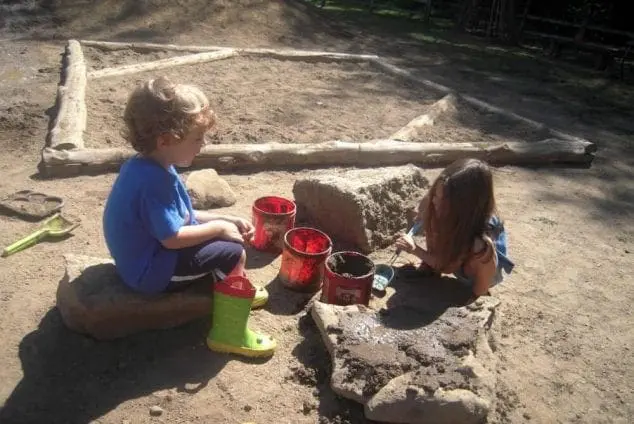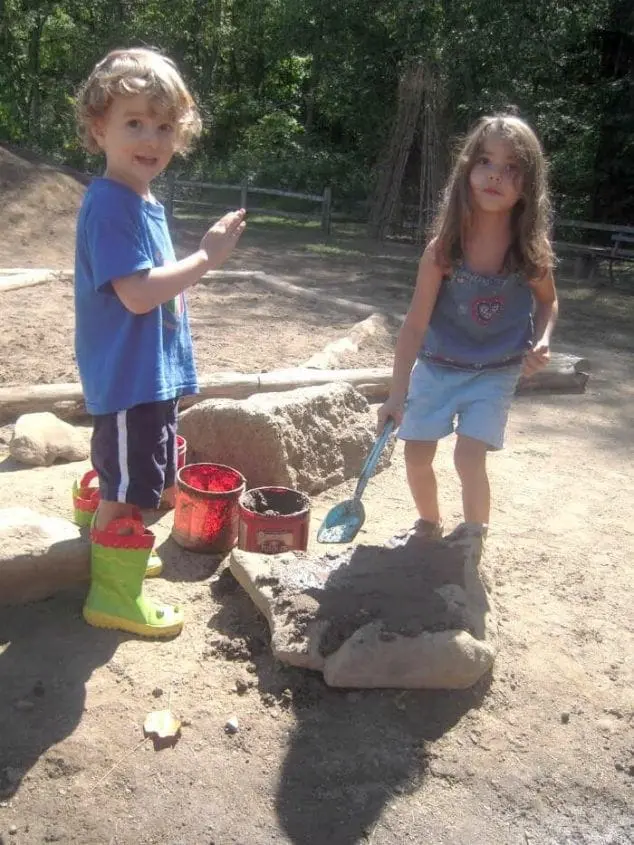We spent the entire morning at the Edwin Warner Nature Center. Again. They love that place! I spend lots of time at the what we call, “the dirt playground” watching my kids playing in the dirt and mud. The hanging sign says, Nature Play so I guess that is the actual, official name. It is sort of like a playground with nature as the main attraction. They love making mud pies, dirt gardens, and dirt volcanoes there. I love seeing them pretend and have fun with “mother earth”!
Nature Play Provides Kids With The Opportunity To Imagine, Create, And Explore

I think that more than ever, nature play is being left out of childhood for many kids. They are spending less and less time outside and our yards are so manicured that they may not have as much space to truly engage in nature when they do go out.
That reminds me of a funny story from my own childhood. It was just me and my mom growing up so she brought me everywhere with her since there was no one to watch me. So one time, she brought me over to her voice lesson and I played in the yard while I was waiting for her. You wouldn’t think one nine year could get into so much mischief in such a short time, but don’t underestimate me! I lived in California at the time and our tiny rented yard was full of lava rocks. So when I discovered a grass filled yard, I decided to create some lovely dirt tunnels and fill them with water. The voice teacher’s husband was not happy. But I loved it!
Kids need an opportunity to play in nature. They need the freedom to explore nature and manipulate it. To imagine becoming self-sufficient, to build forts, and to role play. To plant imaginary gardens, and protect their mud hills from invaders! Nature play is good for creativity, independence, and self-confidence. Furthermore, nature play often involves collaboration, negotiation, and communication with others, which helps develop important social skills such as teamwork and empathy.

Playing in the Dirt and Making Mud Pies Allows Kids To Role Play and Express Themselves
My kids love Nature Play, both as the natural play ground by Warner Park Nature Center, and as the chance for free play in a natural unrestricted setting. They plant imaginary gardens in the dirt bed. They make mud pies and serve them to me and I “eat” them with great relish! Additionally, they make clay pots and “sell” them to each other.
To it mildly, they get dirty! My daughter was into that right away but my son didn’t want to actually get dirt on himself for quite some time. He chose to use sticks or shovels or other tools and was upset if he got dirt on himself. That in itself was a learning experience for him and for me. Though I dreaded doing the laundry with so much dirt on it, I was also really proud of my daughter for digging right in and proud of my son for getting past his fear of getting dirty. I just bring an extra change of clothes with us so they can change before getting back in the car!
…parents are hurting their children by treating dirt as a four-letter word. Our extreme culture of cleanliness and fear of contact with everyday germs is interrupting children’s impulses to explore and experiment, and thwarting the human body’s natural means of protection” –Chicago Tribune

I am thankful that we have that great muddy resource for our kids nearby. It is so nice to have a spot where nature play is allowed and encouraged. Where there aren’t as many restrictions. If they want to make an amazing series of interconnecting dirt tunnels and sail imaginary boats, they don’t have to worry about getting into trouble for digging up the yard. So again, what a great resource to have!
Natural Playground Ideas
If you think your kids will enjoy nature play but you don’t have a great location nearby, you can always create your mini natural playground for your kids in part of your backyard. Creating a natural playground can be a fun and sustainable way to provide play opportunities for children. Here are some ideas:
- Natural Climbing Structures: Use fallen trees, boulders, or create wooden structures that blend into the environment for climbing and balancing.
- Mud Kitchen: Set up an area with pots, pans, and utensils where children can mix natural materials like mud, sand, and water to create imaginary dishes.
- Sensory Garden: Plant a variety of flowers, herbs, and plants that appeal to the senses, such as those with interesting textures, scents, and colors.
- Water Play: Incorporate a small stream, pond, or water pump where children can play with water in a controlled environment.
- Natural Art Area: Provide materials like sticks, stones, leaves, and flowers for children to create art or sculptures.
- Wildlife Habitat: Create spaces with native plants and shelters to attract wildlife like birds, butterflies, and insects, providing opportunities for children to observe and learn about nature.
Nature play gives young children the chance to explore, imagine, and grow in unique ways by engaging with the world around them. Nature play spaces and natural playgrounds, filled with natural features like rocks, trees, and logs, become learning places where unstructured play encourages creativity, problem-solving, and social skills. The benefits of nature play go beyond fun—it helps kids build confidence, stay active, and develop a deeper connection to the environment, making it an invaluable part of childhood development.
Conclusion
Nature play is important for several reasons, as it offers numerous benefits for children and even adults. Playing outdoors encourages physical activity, helping children develop motor skills, strength, and coordination. It also exposes them to natural elements like sunlight, which is a natural source of vitamin D. Furthermore, nature play has been linked to reduced stress, anxiety, and symptoms of ADHD in children. It can also improve mood and overall mental well-being.
Being in natural environments stimulates creativity and imaginative play. Children can invent new games, stories, and activities inspired by the natural world around them. Additionally, nature play stimulates curiosity and encourages exploration, which can enhance cognitive development, including problem-solving skills and scientific reasoning. In fact, natural environments offer a variety of sensory experiences, such as different textures, smells, and sounds, which can help develop children’s sensory processing skills.
Natural play environments often offer more opportunities for risky play, such as climbing trees or balancing on logs, which can help children learn to assess and manage risks, leading to greater resilience. Overall, nature play provides a holistic and enriching experience that supports the development of the whole child, promoting physical, mental, emotional, and social well-being. Do you kids have a place where nature play is allowed and encouraged? Do your kids love playing in mud and dirt? Are you down with mud pies?
Related Posts:
Great Smoky Mountain Camping Vacation with Kids

Marianela says
Nice read =) I say “Yes to Mud Pies!” Kids should spend more time gardening or playing with dirt and less time trapped inside the house. They will physically and emotionally benefit from exposure to dirt from boosting their immune system to enhancing their cognitive skills.
Augusta says
I really enjoyed this post! It’s so inspiring to see how the natural environment can play such a big role in children’s health and development. Programs like the Natural Learning Initiative and resources from the National Wildlife Federation really highlight the value of outdoor play for problem solving and creativity. It reminds me of how much kids can gain from simply spending time at a local park and exploring the world around them.
Ike Mceach says
This article offers such a refreshing reminder of the value of unstructured nature play. I appreciate how you highlight simple yet powerful activities like making mud pies or digging small “mud volcanoes,” which not only spark creativity but also strengthen problem-solving, cooperation, and sensory development. In today’s world, where children often spend more time indoors and on screens, it’s inspiring to see how dirt, mud, and natural materials can provide such rich learning opportunities. Your suggestions for setting up a mud kitchen or sensory garden are both practical and meaningful—encouraging parents to create more space for genuine exploration.
Geovannia says
Such a great read! I love how you highlighted the importance of children’s play and how different types of play support growth in unique ways. Nearby nature offers the perfect setting for unstructured outdoor play, giving kids the freedom to explore, imagine, and connect with the world around them.
StrongBusines says
Great insights on nature play! I recently explored how to design backyard spaces that foster creativity and independence in children. Head over to my blog to see how you can transform your outdoor areas.